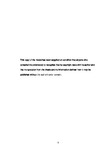Discourses pertaining to, and lived experiences of, 'Maternal Obesity' (Body Mass Index (BMI) ≥ 30) and Gestational Diabetes Mellitus/Type Two Diabetes Mellitus in the pregnancy and post-birth period.
| dc.contributor.supervisor | Letherby, Gayle | |
| dc.contributor.author | Jarvie, Rachel Juliet | |
| dc.contributor.other | Faculty of Arts, Humanities and Business | en_US |
| dc.date.accessioned | 2014-05-13T12:16:31Z | |
| dc.date.available | 2014-05-13T12:16:31Z | |
| dc.date.issued | 2014 | |
| dc.identifier | 10190845 | en_US |
| dc.identifier.uri | http://hdl.handle.net/10026.1/3006 | |
| dc.description.abstract |
This thesis reports on a qualitative exploration of the experiences of 30 women designated as ‘high risk’ due to the co-existence of ‘maternal obesity’ (BMI ≥ 30) and Gestational Diabetes Mellitus (GDM)/Type Two Diabetes Mellitus (T2DM) in pregnancy. This is examined in the context of medico-scientific/public health/ popular media discourses pertaining to ‘maternal obesity’/GDM/T2DM in pregnancy. ‘Maternal obesity’/GDM/T2DM in pregnancy are increasingly prevalent and clinically associated in manifold ways. Increasing prevalence is linked to the ‘global epidemic’ of ‘obesity’/diabetes: now commonly referred to as ‘diabesity’. Current biomedical knowledge asserts ‘maternal obesity’ and diabetes (‘maternal diabesity’) synergise in causing adverse pregnancy outcomes, have long term health implications for the offspring and contribute to an ‘intergenerational cycle’ of ‘obesity’/diabetes. This is the first qualitative study to consider pregnancy/post-birth experiences of women with co-existing ‘maternal obesity’ and GDM/T2DM in pregnancy from a sociological perspective. Participants undertook a series of auto/biographical narrative interviews. Longitudinal engagement provided nuanced psycho-social insight into women’s perceptions/experiences and the socio-cultural context of their lives. Analysis of pertinent ‘pregnancy’ Internet fora postings augmented interview data and was utilised for comparative/corroborative purposes. Participants were predominantly of low socio-economic status, congruent with epidemiological data. The concept of pregnancy ‘planning’ was not resonant and few women accessed/felt predisposed to access preconception care. Women did not identify as ‘obese’, and knowledge/perception of risks associated with the medical ‘conditions’ was low. Women perceived themselves to be stigmatised due to their weight in society and specifically within healthcare. Many participants were experiencing acute/chronic stress which appeared to have mediated risk perceptions/compromised diabetic regimen adherence. Expense of ‘healthy’ eating/diabetic diet was considered prohibitive. Women’s material circumstances/socio-cultural milieux may militate against ability to minimise risk and effect lifestyle change. Policy and practice, for the most part, fails to take this into account. | en_US |
| dc.description.sponsorship | ESRC | en_US |
| dc.language.iso | en | en_US |
| dc.publisher | Plymouth University | en_US |
| dc.subject | Sociology of human reproduction | en_US |
| dc.subject | Pregnancy | |
| dc.subject | Risk | |
| dc.subject | Maternal obesity | |
| dc.subject | Gestational Diabetes Mellitus | |
| dc.subject | Type Two Diabetes Mellitus | |
| dc.subject | Public health discourses | |
| dc.subject | Qualitative | |
| dc.subject | Longitudinal | |
| dc.title | Discourses pertaining to, and lived experiences of, 'Maternal Obesity' (Body Mass Index (BMI) ≥ 30) and Gestational Diabetes Mellitus/Type Two Diabetes Mellitus in the pregnancy and post-birth period. | en_US |
| dc.type | Thesis | |
| plymouth.version | Full version | en_US |
| dc.identifier.doi | http://dx.doi.org/10.24382/3697 |
Files in this item
This item appears in the following Collection(s)
-
01 Research Theses Main Collection
Research Theses Main


